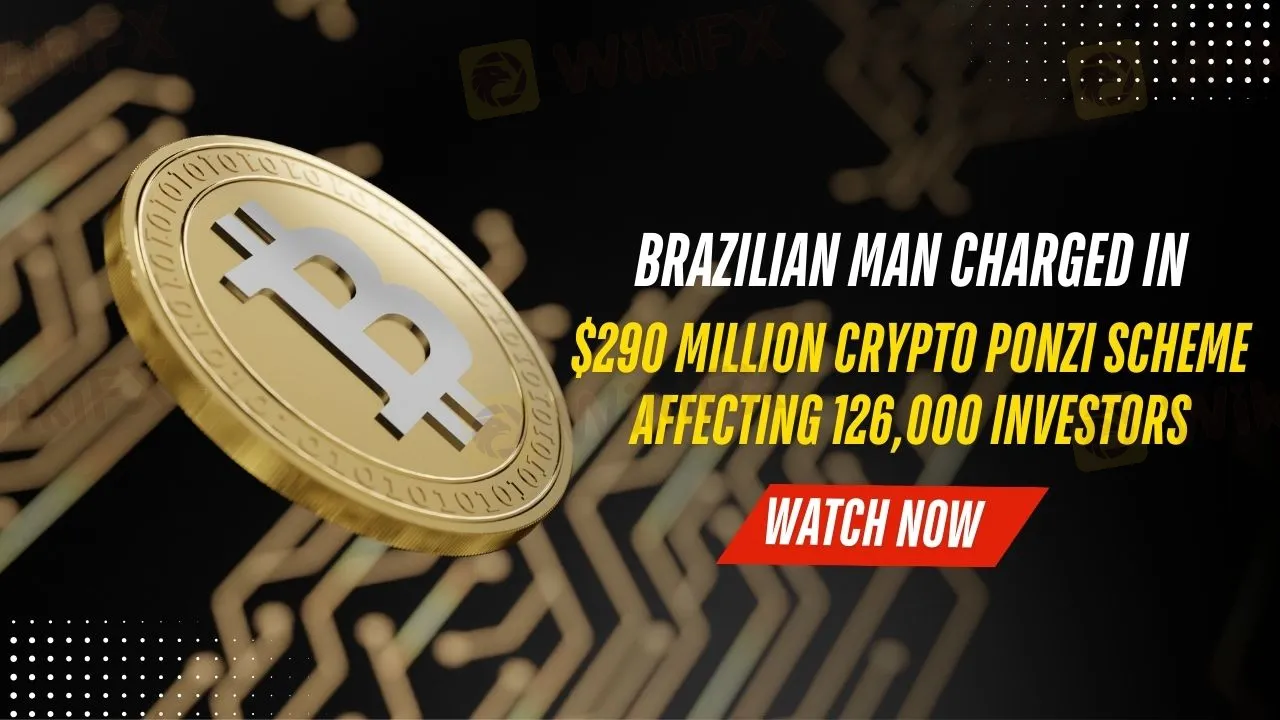Brazilian Man Charged in $290 Million Crypto Ponzi Scheme Affecting 126,000 Investors
Abstract:A Brazilian man, Douver T. Braga, faces charges in a $290 million Ponzi scheme involving 126,000 investors, using Bitcoin in a fraudulent Trade Coin Club platform.

A Brazilian man, Douver T. Braga, has been charged in connection with a massive $290 million cryptocurrency Ponzi scheme that affected over 126,000 investors worldwide. The scheme, which spanned from 2016 to 2021, involved investors being promised high returns through the Trade Coin Club (TCC), a cryptocurrency trading platform that was ultimately revealed to be a fraudulent operation. Braga faces multiple charges of telecommunications fraud and conspiracy linked to his role in orchestrating the scam.
Details of the Ponzi Scheme
According to the indictment, Braga and his co-conspirators set up TCC with the intention of deceiving investors. They falsely claimed that the platform used complex software to generate profits from Bitcoin price fluctuations. However, the platform lacked any genuine investment strategies or software. Early investors were paid returns using funds from later investors, characteristic of a Ponzi scheme.
TCC was promoted globally through various marketing channels, including social media and videos, and Braga claimed the platform had 126,000 members across 231 countries by 2017. The scammers convinced investors to deposit their Bitcoin with TCC by promising them high returns, which ultimately did not materialize. Investors were given access to a fake online portal, where they were able to track non-existent activities.
Between 2016 and 2019, Braga allegedly misappropriated at least $50 million in Bitcoin from investors. As the platform began to collapse, investors were unable to withdraw their funds. In January 2018, TCC announced that it would cease operations in the U.S., leaving many investors in Washington state without recourse.
Legal Actions and Investigations
Bragas fraudulent activities did not go unnoticed, and in 2022, U.S. authorities issued an indictment for his involvement in the scheme. He was arrested in Switzerland and later extradited to the U.S. to face trial. Braga stands accused of 12 counts of telecommunications fraud related to Bitcoin transactions made by investors. Each of these charges carries a potential penalty of up to 20 years in prison.
The investigation into the TCC scam is ongoing, and U.S. authorities, including the IRS Criminal Investigation (CI) division and the FBI, have been working together to gather evidence and bring those responsible to justice. According to W. Mike Herrington, an FBI agent involved in the case, the scam was modernized with Bitcoin but followed the same deceptive principles seen in traditional Ponzi schemes.
Read more

3-Day Online Scam Trap: Victims Lose $200K—Don't Be Next!
Scam syndicates are now exploiting fake online investment schemes, defrauding victims of millions within just three days. According to 2024 police data, online fraud cases surged by 29%, with losses exceeding RM1.57 billion. Non-existent investment scams alone saw an 80% increase, costing victims RM848.62 million.

CFTC Orders Mosaic to Pay Over $1 Million for Fraudulent Crypto Scheme
The U.S. Commodity Futures Trading Commission (CFTC) has recently filed a significant lawsuit against Mosaic Exchange Limited and its CEO, Sean Michael, alleging a fraudulent digital asset commodity scheme that occurred between February 2019 and June 2021.

Two Malaysians Sentenced for Running S$23M Pyramid Scheme in Singapore
Two Malaysian men have been sentenced in Singapore for orchestrating a S$23 million multi-level marketing (MLM) scheme that defrauded approximately 4,500 investors, including over 2,400 in Singapore.

Pastor Defrauded 1500 People in a $6M Ponzi Scheme
The U.S. Commodity Futures Trading Commission (CFTC) has filed a complaint against Francier Obando Pinillo, a pastor in Washington state, alleging his involvement in a $6 million cryptocurrency Ponzi scheme. The case accuses Pinillo of defrauding 1,500 individuals, many of whom were members of his Spanish-speaking congregation in Pasco, Washington.
WikiFX Broker
Latest News
Germany's Election: Immigration, Economy & Political Tensions Take Centre Stage
WikiFX Review: Is IVY Markets Reliable?
Brazilian Man Charged in $290 Million Crypto Ponzi Scheme Affecting 126,000 Investors
ATFX Enhances Trading Platform with BlackArrow Integration
IG 2025 Most Comprehensive Review
Construction Datuk Director Loses RM26.6 Mil to UVKXE Crypto Scam
SEC Drops Coinbase Lawsuit, Signals Crypto Policy Shift
Should You Choose Rock-West or Avoid it?
Scam Couple behind NECCORPO Arrested by Thai Authorities
Franklin Templeton Submitted S-1 Filing for Spot Solana ETF to the SEC on February 21
Rate Calc

